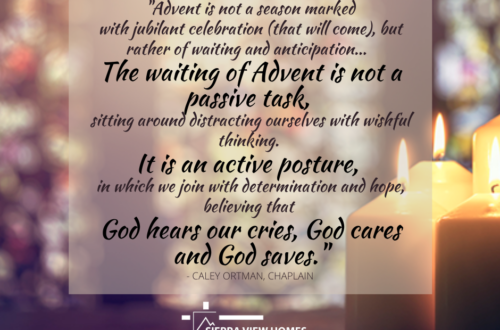Chaplain’s Corner: Beauty in Suffering
When we experience hardship and tribulation in life our tendency is to immediately question things. Question what we might have done wrong to deserve such hardship, question how a good God could allow us to experience such tribulation in the first place, question whether the universe bends towards darkness and not towards light.
Questions like these, of course, assume that our well-being is a priority over all else in the universe. It is not unreasonable that we think like this. After all, Psalm 8 tells us that we are “made a little lower than the angels and crowned with glory and honor” (v5). But then again, the first three verses of the Psalm are spent contemplating just how small we are when one looks at the whole scope of creation.
One of the mysteries of the universe seems to be that beauty is so often baked into sacrifice and hardship. In a recent article titled ‘The Beauty and the Sacrifice’, Pastor Jeryl Hollinger reflects that it is beauty that sustains the world and yet sometimes beauty consumes beauty. We see it all the time in nature. One animal kills another in order to feed its young. We thin out healthy carrots so the others may grow bigger. We pick flowers to make a beautiful centerpiece knowing that clipping them means their inevitable death.
Hollinger writes that this is not a problem to be fixed but “a reality to be faced and a truth to be remembered, a challenge to gain perspective…the heart of all spirituality is to see the beauty of life and rejoice in it, to serve it and sacrifice for it, to know its pain and feel its cost. Life, in all its forms, is never to be taken for granted.”
This paradox of beauty and suffering flows throughout our Gospels. Jesus walks the road less-traveled, loving, healing and creating community on the margins of society, knowing that the scandal it would create would cost him everything, including his life. It is the tragedy of all tragedies, and yet, out of his life was born the church, as well as a deeper revelation of what true beauty and true love can look like.
Jesus told his disciples once: “unless a kernel of wheat falls into the ground and dies, it remains a single kernel; but if it dies it produces a great harvest” (John 12:24). We need not look for suffering in this world, but when it encounters us, may we have the grace to let our kernels fall where they may, thinking always of the blessing of beauty that God’s transformation can bring forth.
– Caley Ortman, Chaplain





